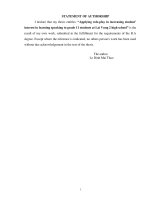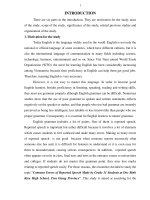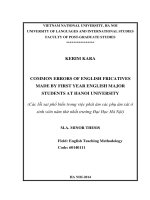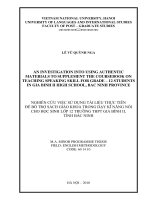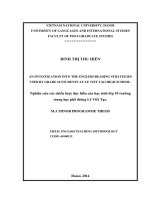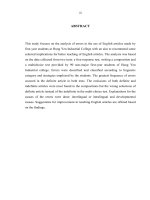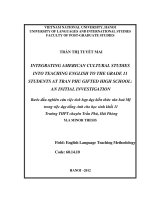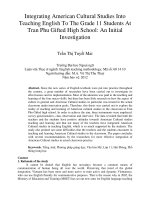the study common errors of reported speech made by grade 11 students at doc binh kieu high school, kien giang province
Bạn đang xem bản rút gọn của tài liệu. Xem và tải ngay bản đầy đủ của tài liệu tại đây (1.16 MB, 61 trang )
1
INTRODUCTION
There are six parts in the introduction. They are motivation for the study, aims
of the study, scope of the study, significance of the study, related previous studies and
organization of the study.
1. Motivation for the study
Today English is the language widely used in the world. English is not only the
national or official language of some countries, which have different cultures, but it is
also the international language of communication in many fields including science,
technology, business, entertainment and so on. Since Viet Nam joined World Trade
Organization (WTO), the need for learning English has been considerably increasing
among Vietnamese because their proficiency in English can help them get good jobs.
Therefore, learning English is very necessary.
However, it is not easy to master this language. In order to become good
English learners, besides proficiency in listening, speaking, reading and writing skills,
they must use grammar properly although English grammar can be difficult. Numerous
studies show that the use of poor grammar in spoken and written statements reflects
negatively on the speaker or author, and that people who use bad grammar are instantly
perceived as being less intelligent, less reliable or less trustworthy than people who use
proper grammar. Consequently, it is essential for English learners to master grammar.
English grammar includes a lot of points. One of them is reported speech.
Reported speech is important but rather difficult because it involves a lot of elements
which causes students to feel confused and make many errors. Making so many errors
of reported speech is not good because when someone reports incorrectly what
someone else has said, it is difficult for listeners to understand or it is even easy for
them to misunderstand, causing serious consequences. In addition, reported speech
often appears on tests in class, final tests and tests in the entrance exams to universities
and colleges. If students do not master this grammar point, they may lose marks
relating to reported speech easily. For those reasons, the researcher decided to study the
topic “Common Errors of Reported Speech Made by Grade 11 Students at Doc Binh
Kieu High School, Tien Giang Province”. This study is aimed at searching for the
2
grade 11 students‟ common errors and suggesting some solutions to help the students
use reported speech better.
2. Aims of the study
- To find out grade 11 students‟ common errors in using reported speech.
- To suggest some solutions to help the students avoid these errors.
3. Scope of the study
The study is about common errors of reported speech based on the exercise the
researcher gives grade 11 students at Doc Binh Kieu High School.
4. Significance of the study
The study including the solutions suggested will help students avoid common
errors of reported speech. Some solutions are suggested for teachers so that they can
apply to help the students in learning reported speech.
5. Related previous studies
Many theses relating to reported speech have been studied. The research
“Teaching Reported Speech” done by Dan Rej Regmi was about the major mistakes
made by the learners of Grade XII of Management stream. However, the researcher
only gave suggestions for teachers to teach their Nepalese students in order to help
them understand and use reported speech precisely.
In Vietnam, Le Thi Thu Quynh, student of Ho Chi Minh University of
Education did the research “Indirect speech in English and Vietnamese: A comparative
contrastive analysis” in 2010. In this research, the researcher has pointed out basic
similarities and differences in indirect speech between Vietnamese and English as well
as some major mistakes made by Vietmanese. However, the subjects were Vietnamese
learners in general and the researcher gave a general suggestion instead of specific ones
to help them avoid those errors. The suggestion was that Vietnamese people have to
pay more attention to grammar structure when they want to change an English indirect
speech into the direct one.
3
6. Organization of the study
INTRODUCTION
Chapter 1 LITERATURE REVIEW
1.1 Definition of reported speech
1.2 Types of reported speech
1.2.1 Reported statements
1.2.2 Reported imperatives
1.2.3 Reported questions
1.2.4 Reported exclamations
1.2.5 Mixed types of reported speech
13. Changes of direct speech when turned into reported speech
1.3.1 Pronoun changes
1.3.2 Adjective changes
1.3.3 Tense changes
1.3.4 Modal verb changes
1.3.5 Adverb changes
1.3.6 Exceptions
Chapter 2 METHODOLOGY
2.1 Research questions
2.2 Research participants
2.2.1 The researcher
2.2.2 The subjects
2.3 Data collection instruments
2.3.1 The questionnaire
2.3.2 The mini-test
2.4 Research procedure
2.4.1 The questionnaire
2.4.1 The mini-test
4
Chapter 3 RESULTS, DISCUSSIONS AND SUGGESTIONS
3.1 Results
3.1.1 Results collected from the questionnaire
3.1.2 Results collected from the mini-test
3.2 Discussions
3.2.1 The questionnaire
3.2.2 The mini-test
3.3 Suggestions
3.3.1 For the teachers
3.3.2 For the students
CONCLUSION AND LIMITATIONS
REFERENCES
APPENDIX 1
APPENDIX 2
APPENDIX 3
5
Chapter 1 LITERATURE REVIEW
In this chapter, the theory of reported speech is presented including definition of
reported speech, types of reported speech and changes of direct speech when turned
into reported speech.
1.1 Definition of reported speech
Reported speech or indirect speech refers to using a noun clause to report what
someone has said. No quotation marks are used. ( 3 )
Example:
Direct speech: She said, “She hasn‟t met Susan for two years.”
Reported speech: She said (that) she hadn‟t met Susan for two years.
1.2 Types of reported speech
1.2.1 Reported statements
Statements (“S + V”)
Reported speech
Examples:
Direct speech: “I‟m waiting for my mother,” he said.
Reported speech: He said that he was waiting for his mother.
Direct speech: Rick said to me, “Anne has written Jim a letter.”
Reported speech: Rick told me that Anne had written Jim a letter.
Direct speech: She hopes, “I will pass the exam.”
Reported speech: She hopes that she will pass the exam.
1.2.2 Reported imperatives
Affirmative imperatives (“V……”)
Reported speech
S + say / said / + (that) + S + V
tell + O / told + O /…
think / thought /…
hope / hoped /…
…………….
6
Examples:
Direct speech: The teacher said to me, “Show me your notebook.”
Reported speech: The teacher told me to show her my notebook.
Direct speech: He said to me, “Remember to come here on time.”
Reported speech: He asked me to come there on time.
Direct speech: “Please give me some money,” said the old man to us.
Reported speech: The old man begged us to give him some money.
Direct speech: The boss tells me, “Come in!”
Reported speech: The boss tells me to come in.
Negative imperatives (“Don’t + V…/ Never + V…/ ”)
Reported speech
Examples:
Direct speech: She said to her husband, “Don‟t drive too fast.”
Reported speech: She told her husband not to drive too fast.
Direct speech: The teacher says to her students, “Never go to school late.”
Reported speech: The teacher tells her students never to go to school late.
S + tell / told / … + O + to + V
ask / asked / …
beg / begged / …
order / ordered / …
…………….
S + tell / told / … + O + not to + V
never to
ask / asked / …
beg / begged / …
order / ordered / …
…………….
7
1.2.3 Reported questions
Yes-No Questions (“Auxiliary + S + …?” )
Reported speech
Examples: Direct speech: She said to me, “Are you hungry?”
Reported speech: He asked me if / whether I was hungry.
Direct speech: He said to himself, “Will she arrive on time?”
Reported speech: He wondered if /whether she would arrive on time.
Direct speech: He enquires, “Does the train stop at York?”
Reported speech: He enquires if / whether the train stops at York.
Or-Questions (“Auxiliary + S …+ or + …? ” )
Reported speech
Examples:
Direct speech: Mary‟s mother said to her, “Do you like the blue hat or the green one?”
Reported speech: Mary‟s mother asked her if/whether she liked the blue hat or the
green one.
Direct speech: “Would you rather travel by car or by train?” she asks me.
Reported speech: She asks me if/whether I would rather travel by car or by train.
S + ask / asked + ( O ) + if + S +V
whether
enquire / enquired / …
wonder / wondered / …
want to know / wanted to know / …
…………….
S + ask / asked / … + (O) + if + S +V + or +…
whether
enquire / enquired / …
wonder / wondered / …
want to know / wanted to know /…
…………….
8
Wh-Questions ( “ Question words + auxiliary + S + …? ” )
Reported speech
Examples:
Direct speech: “Who is going to live in the big house?” he enquired.
Reported speech: He enquired who was going to live in the big house.
Direct speech: “Who does English belong to?” our teacher has just said to us.
Reported speech: Our teacher has just asked us who English belongs to.
Direct speech: “How do you learn English?” she asks him.
Reported speech: She asks him how he learns English.
1.2.4 Reported exclamations
Exclamations(“ …!”)
Reported speech
S + ask / asked / … + (O) +
enquire / enquired / …
wonder / wondered / …
want to know / wanted to know /…
…………….
S + ask / asked / … + (O) +
enquire / enquired / …
wonder / wondered / …
want to know / wanted to know /…
…………….
who + V
what
which
who + S + V
what
which
whom
where
when
why
how
…
S + exclaim / exclaimed /… + (that) + S + V
say / said /
…………….
9
Examples:
Direct speech: He said, “What a dreadful idea!”
Reported speech: He exclaimed that it was a dreadful idea.
Direct speech: She says, “What a beautiful dress!”
Reported speech: She says that it is a very beautiful dress.
1.2.5 Mixed types of Reported Speech
Direct speech may consist of statement + question, question + imperative, imperative +
statement or all together.
* Rule1
Often each type requires its own introductory verb and the conjunction „and‟ is used to
link them.
Examples:
Direct speech: “ I‟m a stranger. Can you tell me how to get to the post office?” she said.
Reported speech: She said she was a stranger and asked if I could tell her how to get
to the post office.
* Rule2
When the second clause is a statement explaining the first, the conjunction „ as‟ can be
used instead of a second introductory verb
Examples:
Direct speech: “Don‟t turn off the light. It is dark here.” my sister said.
Reported speech: My sister told me not to turn off the light as it was dark there
*Rule3
Sometimes the second introductory verb can be a participle
Examples:
Direct speech: “Please, please don‟t smoke. Remember that it is harmful to your
health,” his wife said.
Reported speech: His wife begged him not to smoke reminding him that it was
harmful to your health
10
1.3 Changes of direct speech when turned into reported speech
1.3.1 Pronoun changes
Personal, reflexive and possessive pronoun changes
* Rule1: First person pronouns in the direct speech change from the first person to
the person of the subject of the reporting verb in the reported speech.
Example:
Direct speech: He said, “I am a student.”
Reported speech: He said that he was a student.
* Rule2: Second person pronouns in the direct speech change from the second person
to the person of the object of the reporting verb in the reported speech.
Example:
Direct speech: She said to me, “You are very kind.”
Reported speech: She told me that I was very kind.
* Rule3: Third person pronouns in the direct speech will not change in the reported
speech.
Example:
Direct speech: The manager said, “They are hard workers.”
Reported speech: The manager said that they were hard workers.
* Notes:
- The new (changed) pronoun will have the same case and number as the original
one.
Example:
Direct speech: He said, “This book is mine.”
Reported speech: He said that that book was his.
- In some cases, to avoid confusion, we can use the former and the latter instead
of the pronouns mentioned in the rules above.
Examples:
Direct speech: Tom said to Peter, “Miss White wants to meet me in the office.”
Reported speech: Tom told Peter that Miss White wanted to meet the former in the
office.
Direct speech: Tom said to Peter, “Miss White wants to meet you in the office.”
11
Reported speech: Tom told Peter that Miss White wanted to meet the latter in the
office.
Demonstrative pronoun changes
this that
these those
Examples:
Direct speech: She said, “This is Tom‟s house.”
Reported speech: She said (that) that was Tom‟s house.
Direct speech: He said, “These are my new pens.”
Reported speech: He said that those were his new pens.
1.3.2 Adjective changes
Possessive adjective changes
The rule of possessive adjective changes in reported speech is the same as that of
possessive pronoun changes mentioned above.
Examples:
Direct speech: He said, “I haven‟t finished my work.”
Reported speech: He said that he hadn‟t finished his work.
Direct speech: My sister said to me, “Don‟t put your bag here.”
Reported speech: My sister told me not to put my bag there.
Direct speech: Alice said, “I don‟t know their names.”
Reported speech: Alice said that she didn‟t know their names.
Demonstrative adjective changes
The rule of demonstrative adjective changes in reported speech is the same as that of
demonstrative pronoun changes mentioned above.
Examples:
Direct speech: He said, “This room needs painting.”
Reported speech: He said that that room needed painting.
Direct speech: She said, “These books are mine.”
Reported speech: She said that those books were hers.
12
1.3.3 Tense changes
* Rule 1
If the reporting verb is in the past tense, tenses of the verbs in the direct speech will be
changed into their corresponding past tenses in the reported speech. The changes are
shown in the following table.
Direct speech
Reported speech
Simple present
Mary said, “I am a secretary.”
Simple past
Mary said that she was a secretary.
Present continuous
She said, “I am listening to music.”
Past continuous
She said that she was listening to music.
Present perfect
She said, “I have been to Da lat.”
Past perfect
She said that she had been to Da lat.
Present perfect continuous
The clerk said, “I have been learning
English for ten years.”
Past perfect continuous
The clerk said that she had been learning
English for ten years.
Simple past
My friend said, “My brother bought a
computer yesterday.”
Past perfect
My friend said that his brother had bought a
computer the day before.
Past continuous
He said, “We were having dinner at 7
p.m yesterday.”
Past perfect continuous
He said that they had been having dinner
7p.m the day before.
Past perfect
He said, “I had turned off the TV
before 8 a.m.”
Past perfect (unchanged)
He said he had turned off the TV before 8
a.m.
Past perfect continuous
Past perfect continuous (unchanged)
13
He said, “I had been waiting for ten
minutes when the bus arrived.”
He said that he had been waiting for ten
minutes when the bus arrived.
Simple future
My mother said to me, “I will buy you
a new watch tomorrow.”
Simple future in the past (Conditional)
My mother told me that she would buy me a
new watch the following day.
Future continuous
My friend said, “I will be watching
TV at 8 o‟clock tomorrow.”
Future continuous in the past (Conditional
continuous)
My friend said that she would be watching
TV at 8 o‟clock the following day.
But note that there are some exceptions:
- There are no tense changes in the reported speech if the reported words are true at
the time of reporting.
Example:
Direct speech: He said, “I am 24 years old.”
Reported speech: He said that he is 24 years old. (Now he is 24 years old.)
- There are no tense changes in the reported speech if the reported words express a
general truth.
Example:
Direct speech: Our geography teacher said, “The Earth revolves around the Sun.”
Reported speech: Our geography teacher said that the Earth resolves around the Sun.
- There are no tense changes in reported speech if the reported words refer to unreal
situations.
Examples:
Direct speech: My sister said, “If I were a billionaire, I would help the poor.”
Reported speech: My sister said that if she were a billionaire, she would help the
poor.
Direct speech: He said, “If I had worked hard, I would have passed the exam.”
14
Reported speech: He said that if he had worked hard, I would have passed the
exam.
- There are no tense changes in reported speech if the reported words contain unreal
past tenses after wish, would rather/sooner and it is time.
Examples:
Direct speech: Tom said, “I wish I could travel around the world.”
Reported speech: Tom said that he wished he could travel around the world.
Direct speech: She said to him, “I would rather you did not smoke here.‟
Reported speech: She told him that she would rather he did not smoke there.
Direct speech: He said, “It‟s time the government did something to save the
environment.”
Reported speech: He said that it was time the government did something to save the
environment.
* Rule 2
If the reporting verb is in simple present, present continuous, present perfect and future
tenses, tenses of the verbs in the direct speech will not be changed in the reported
speech.
Example:
Direct speech: He says, “I listen to the radio every day.”
Reported speech: He says that he listens to the radio every day.
1.3.4 Modal verb changes
* Rule 1
Modal verbs in the direct speech will be changed into the corresponding past forms in
the reported speech if the reporting verb is in the past tense. The changes are shown in
the following table.
Direct speech
Reported speech
can (ability)
Ex: She said to me, “Can you swim?”
could
Ex: She asked me if I could swim.
may (possibility)
might
15
Ex: He said, “It may rain.”
Ex: He said that it might rain.
may ( permission)
Ex: Our parents said to us, “You may
watch TV in your free time.”
could
Ex: Our parents told us that we could
watch TV in our free time.
must (obligation, present)
Ex: “Need I eat it all, mummy?” said
the child.
“Yes, dear, you must,” she said.
must/had to
Ex: The child asked his mother if he had to
eat it all and she said that he must/had to.
must (obligation, future)
Ex: My father said to me, “You must
work harder next term.”
must/would have to
Ex: My father told me that I must/would
have to work harder the next term.
needn’t (necessity, present)
Ex: He said, “I needn’t be in the room
till 5 p.m.”
needn’t/didn’t have to
Ex: He said that he needn’t / didn’t have
to be the room till 5 p.m.”
needn’t (necessity, future)
Ex: I said, “If you can lend me the
money, I needn’t go to the bank.”
needn’t / wouldn’t have to
Ex: I said that if he could lend me the
money, I needn’t / wouldn’t have to go to
the bank.
shall ( future)
Ex 1: I said, “I shall buy a new bicycle
if I have enough money.”
Ex 2: He said, “I shall buy a new
bicycle if I have enough money.”
(I/we + should / would),
(You/he/she/it/they + would)
Ex 1: I said that I should / would buy a
new bicycle if I had enough money.
Ex 2: He said that he would buy a new
bicycle if he had enough money.
16
shall ( offers, requests for advice and
confirmation)
Ex: He asked his wife, “Where shall I
put this box?”
should
Ex: He asked his wife where he should put
that / the box.
will
Ex: She said, “They will come in time.”
would
Ex: She said that they would come in time.
* Rule 2
In the reported speech, such words as had better, would rather/sooner, ought
to, used to, should, would, could, might remain unchanged.
Examples:
Direct speech: “The children had better/ should go to bed early,” the doctor said.
Reported speech: The doctor said that children had better/should go to bed early.
Direct speech: He said, “I would rather travel by car.”
Reported speech: He said that he would rather travel by car.
Direct speech: “They ought to widen this road,” she said.
Reported speech: She said that they ought to widen that road.
Direct speech: “I used to play marbles when I was young,” he said.
Reported speech: He said that he used to played marbles when he was young.
Direct speech: “It might be colder,” she said.
Reported speech: She said that it might be colder.
Direct speech: “I couldn’t stand on my head,” he said.
Reported speech: He said that he couldn’t stand on his head.
Direct speech: She said to her boyfriend, “If I were you, I would apply for the job.”
Reported speech: She told her boyfriend that if she were him, she would apply for
the job.
17
1.3.5 Adverb changes
Adverb changes in the reported speech are shown in the following table:
Direct speech
Reported speech
here
Ex: He said, “Put the desk here, Peter.”
there
Ex: He told Peter to put the desk there.
this
Ex: She said, “I met him this morning.”
that
Ex: She said that she had met him that
morning.
these
Ex: He said to me, “Don‟t put your
books on these tables.”
those
Ex: He told me not to put my books on
those tables.
now / at present
Ex: She said, “He is working now.”
then
Ex: She said that he was working then.
Ago
Ex: He said, “I graduated from high
school 4 years ago.”
before
Ex: He said that he had graduated from
high school 4 years before.
Today
Ex: She said, “We study geography
today.”
that day
Ex: She said they studied geography
that day.
yesterday
Ex: He said, “I went swimming
yesterday.”
the day before/ the previous day
Ex: He said that he had gone swimming
the day before/ the previous day.
the day before yesterday/ two days
ago
two days before/two days earlier
Ex: She said that her mother had taken
18
But note that there are some exceptions:
- If the speech is made and reported on the same day, these time changes are not
necessary.
- If the speech is made and reported at the same place, these place changes are not
necessary.
Examples:
Direct speech: At breakfast this morning he said, “ I‟ll be very busy today”
Reported speech: At breakfast this morning he said that he would be very busy
today.
Direct speech: In this room he said, “ I will have a meeting here.”
Reported speech: In this room he said that he would have a meeting here
Ex: She said, “My mother took me to
the zoo the day before yesterday.”
her to the zoo two days before/ two
days earlier.
last night
Ex: He said, “I stayed up late last
night.”
the previous night /the night before
Ex: He said that he had stayed up late
the previous night / the night before.
Tomorrow
Ex: He said, “It may rain tomorrow.”
the following day/ the next day
Ex: He said that it might rain the
following day/ the next day.
the day after tomorrow/in two days
Ex: She said, “I will return home the
day after tomorrow.”
in two days’ time / two days later
Ex: She said that I would return home
in two days’ time/ two days later.
tomorrow evening
Ex: “We are going to have a party
tomorrow evening,” she said.
the following evening / the next
evening
Ex: She said that we were going to
have a party the following evening/
the next evening.
19
1.3.6 Exceptions
In reality, direct speech is sometimes turned into reported speech according to the
meaning instead of the structures mentioned above. The exceptions fall into such
groups as thanks, advice, encouragement, congratulation, compliment, wish, dream,
promise, request, suggestion, insistence, admission, denial, apology, blame, accusation,
warning , prohibition and so on. For example:
* Thanks:
Direct speech: “ It was nice of you to visit me. Thank you,” Mary said to me
Reported speech: Mary thanked me for visiting her.
* Advice:
Direct speech: “You‟d better not swim too far from the shore,” he said to us.
Reported speech: He advised us not to swim too far from the shore.
* Encouragement:
Direct speech: “ You should take part in the English Speaking Competition,” said the
teacher to us .
Reported speech: The teacher encouraged us to take part in the English Speaking
Competition.
* Congratulation:
Direct speech: “I hear you passed your exams. Congratulations!” Peter said to us.
Reported speech: Peter congratulated us on passing our exams.
* Compliment:
Direct speech: “ What a beautiful hat you have!” said Tom to Alice.
Reported speech: Tom complimented Alice on her beautiful hat
* Wish:
Direct speech: He said, “Happy Christmas!”
Reported speech: He wished me a happy Christmas.
* Dream:
Direct speech: “ I‟ve always want to be healthy ” Alice said.
Reported speech: Alice has always dreamed of being healthy.
* Promise:
Direct speech: He said to me, “ I will send you details of the competition ”
20
Reported speech: He promised to send me details of the competition.
* Request:
Direct speech: “Could you send me details of the competition?” I said to him.
Reported speech: I asked him to send me details of the competition.
* Suggestion:
Direct speech: Mary said, “ Let‟s talk about the General knowledge Quiz ”
Reported speech: Mary suggested talking about the General knowledge Quiz.
* Insistence:
Direct speech: “ We must be given every detail of the contest, ” they insisted.
Reported speech: They insisted on being given every detail of the contest.
* Admission:
Direct speech: She said, “ To tell the truth, I haven‟t participated in a singing contest”
Reported speech: She admitted not having participated in a singing contest
* Denial:
Direct speech: “ Me? No, I didn‟t take your pen,” said Tom to Mary.
Reported speech: Tom denied having taken Mary‟s pen.
* Apology:
Direct speech: “I‟m sorry, I didn‟t phone you earlier.” Mary said.
Reported speech: Mary apologized for not phoning me earlier.
* Blame:
Direct speech: He said to me, “ It was your fault. You ignored the notice.”
Reported speech: He blamed me for ignoring the notice.
* Accusation:
Direct speech:, “You didn‟t pay attention to the lesson,” the teacher said to Paul.
Reported speech: The teacher accused Paul of not paying attention to the lesson
* Warning:
Direct speech: She said to us, “ Don‟t go alone in the dark.”
Reported speech: She warned us against going alone in the dark.
* Prohibition:
Direct speech:She said to her children, “ You can‟t go out after dark.”
Reported speech: She prevented her children from going out after dark.
21
1.4 Summary of reported speech used in grade 11 student’s English book
After considering the grammar point of reported speech in grade 11 student‟s
English book, the researcher found out three main points relating to reported speech as
follows:
1.4.1 Reported speech with infinitive
* Affirmative imperatives
Examples:
Direct speech: The teacher said to me, “Show me your notebook.”
Reported speech: The teacher told me to show her my notebook.
Direct speech: He said to me, “Remember to come here on time.”
Reported speech: He asked me to come there on time.
Direct speech: The boss tells me, “Come in!”
Reported speech: The boss tells me to come in.
* Negative imperatives
Examples:
Direct speech: She said to her husband, “Don‟t drive too fast.”
Reported speech: She told her husband not to drive too fast.
Direct speech: The teacher says to her students, “Never go to school late.”
Reported speech: The teacher tells her students never to go to school late.
* Advice, encouragement, promise, request…
Examples:
Direct speech: “You‟d better not swim too far from the shore,” he said to us.
Reported speech: He advised us not to swim too far from the shore.
Direct speech: “You should take part in the English Speaking Competition,” said the
teacher to us .
Reported speech: The teacher encouraged us to take part in the English Speaking
Competition.
Direct speech: He said to me, “I will send you details of the competition”
Reported speech: He promised to send me details of the competition.
Direct speech: “Could you send me details of the competition?” I said to him.
Reported speech: I asked him to send me details of the competition.
22
1.4.2 Reported speech with gerund
* Suggestion, denial, insistence, dream, congratulation, thanks, apology…
Examples:
Direct speech: Mary said, “Let‟s talk about the General knowledge Quiz.”
Reported speech: Mary suggested talking about the General knowledge Quiz.
Direct speech: “Me? No, I didn‟t take your pen,” said Tom to Mary.
Reported speech: Tom denied having taken Mary‟s pen.
Direct speech: “We must be given every detail of the contest,” they insisted.
Reported speech: They insisted on being given every detail of the contest.
Direct speech: “I‟ve always want to be healthy” Alice said.
Reported speech: Alice has always dreamed of being healthy.
Direct speech: “I hear you passed your exams. Congratulations!” Peter said to us.
Reported speech: Peter congratulated us on passing our exams.
Direct speech: “It was nice of you to visit me. Thank you,” Mary said to me
Reported speech: Mary thanked me for visiting her.
Direct speech: “I‟m sorry, I didn‟t phone you earlier.” Mary said.
Reported speech: Mary apologized for not phoning me earlier.
1.4.3 Reported speech with conditional sentences
* Tenses in conditional sentences type change in the usual way.
Example: Direct speech: She said to me, “If you work hard, you will pass the exam.”
Reported speech: She told me if I worked hard, I would pass the exam.
* Tenses in conditional sentences types 2 and 3 remain unchanged.
Examples:
Direct speech: My sister said, “If I were a billionaire, I would help the poor.”
Reported speech: My sister said that if she were a billionaire, she would help the
poor.
Direct speech: He said, “If I had worked hard, I would have passed the exam.”
Reported speech: He said that if he had worked hard, I would have passed the
exam.
23
Chapter 2 METHODOLOGY
There are four parts in chapter 2. They are research questions, research
participants, data collected instruments and research procedure
2.1 Research questions
1. What are common errors grade 11 students make when dealing with direct
speech into reported speech?
2. What are the solutions to these problems?
2.2 Research participants
2.2.1 The researcher
The research is done by Nguyen Thi My Hanh, a fourth year student of English
class 2009A of Foreign Language Faculty at Dong Thap University.
2.2.2 The subjects of the research
The subjects of the research are 79 students of class 11A
9
and 11A
13
at Doc Binh
Kieu High School, Cai Lay Town, Cai Lay District, Tien Giang Province. The students
in these two classes are chosen to participate in my study for two main reasons. First,
they have been taught quite enough knowledge of reported speech, so it is possible for
the researcher to test the students‟ knowledge of every aspect related to this English
grammar point. Second, if they still make mistakes, some useful solutions will be taken
to help them avoid making mistakes in reported speech. Therefore, they may improve
their skills in using reported speech. Besides most of the students don‟t have their own
computers. However, the library of their school is equipped with many computers
linked with the Internet for them to search information if they want. The students study
in classrooms with computers and projectors, a good condition for them to acquire
knowledge.
2.3 Data collection instruments
2.3.1 The questionnaire
The questionnaire which was invented by Sir Francis Galton is a useful way to
collect data from the subjects. There are two types of questions in this instrument. They
are close questions and open questions. Close questions require the respondents to
choose the best among the given options. Meanwhile, open questions require the
respondents to give their own answers.
24
In this study, there are 10 questions in the questionnaire. The questions are
mainly about the respondents‟ attitude toward reported speech. They have been
designed as follows.
Item 1 is used to know how students feel about English reported speech.
Item 2 is used to know how the students feel about reported speech.
Item 3 is designed to find out how many opportunities of practising reported
speech were given to the students in their lesson about reported speech.
Item 4 is used to know which elements of reported speech the students like
dealing with.
Item 5 is applied to know how the students rank the elements which need
changing according to degrees of difficulty.
Item 6 is used to know which type of reported speech the students think is the
most difficult.
Item 7 is employed to find out in what types of reported speech the students
make mistakes most often.
Item 8 is used to know how the students recognize their errors of reported
speech.
Item 9 is applied to find out how the students‟ errors of reported speech have
been corrected.
Item 10 is implemented to know what the students often do to overcome
difficulties in learning reported speech.
2.3.2 The mini-test
The test consists of exercises about the research area. It helps the researcher to
have a general view of the test takers‟ strengths and weaknesses. Through the test, the
researcher would like to suggest some solutions aimed at helping the students improve
their weak points. There are 30 items in this mini-test.
Items 1 to 3 are designed to check whether the students know how to use
reporting verbs.
Items 4 to 6 are implemented to test the students‟ knowledge of pronoun
changes.
25
Items 7 to 9 are used to find out if the students know how to change possessive
adjectives and demonstrative adjectives.
Items 10 to 12 are used to test the students‟ knowledge of tense changes.
Items 13 to 17 are applied to check if the students remember the cases in which
there are no tense changes.
Items 18 to 19 are used to know whether the students understand how to change
modal verbs.
Items 20 to 23 are used to test the students‟ knowledge of the cases in which
modal verbs are not changed.
Items 24 to 25 are designed to check whether the students know the rules of
adverb changes.
Items 26 to 30 are employed to check if the students know the exceptions in
changing reported speech.
2.4 Research procedure
2.4.1 The questionnaire
The researcher delivered 79 copies of the questionnaire to 79 students in class
11A
9
and 11A
13
on 5
th
April, 2013. Class 11A
9
is the class the researcher practised
teaching but class 11A
13
is not. Both of the classes have been following the basic
syllabus by Ministry of Education and Training, which is suitable for the purpose of the
study. All the copies of the questionnaire were collected one day later so that the
respondents could complete the questionnaire more comfortably. Furthermore, they
weren‟t influenced by their classmates‟ ideas. Therefore, this might help make the
result of the study more precise and realistic.
2.4.2 The mini-test
The researcher also delivered 79 copies of the mini-test to the 79 students of the
two classes 11A
9
and 11A
13
and collected them 30 minutes later. That is, students had
to do the mini-test in class under the supervision of the researcher in 30 minutes.
Supervising the students during their mini-test might help the researcher know the
students‟ ability more exactly and suggest suitable solutions aimed at helping them
overcome difficulties in learning reported speech.
